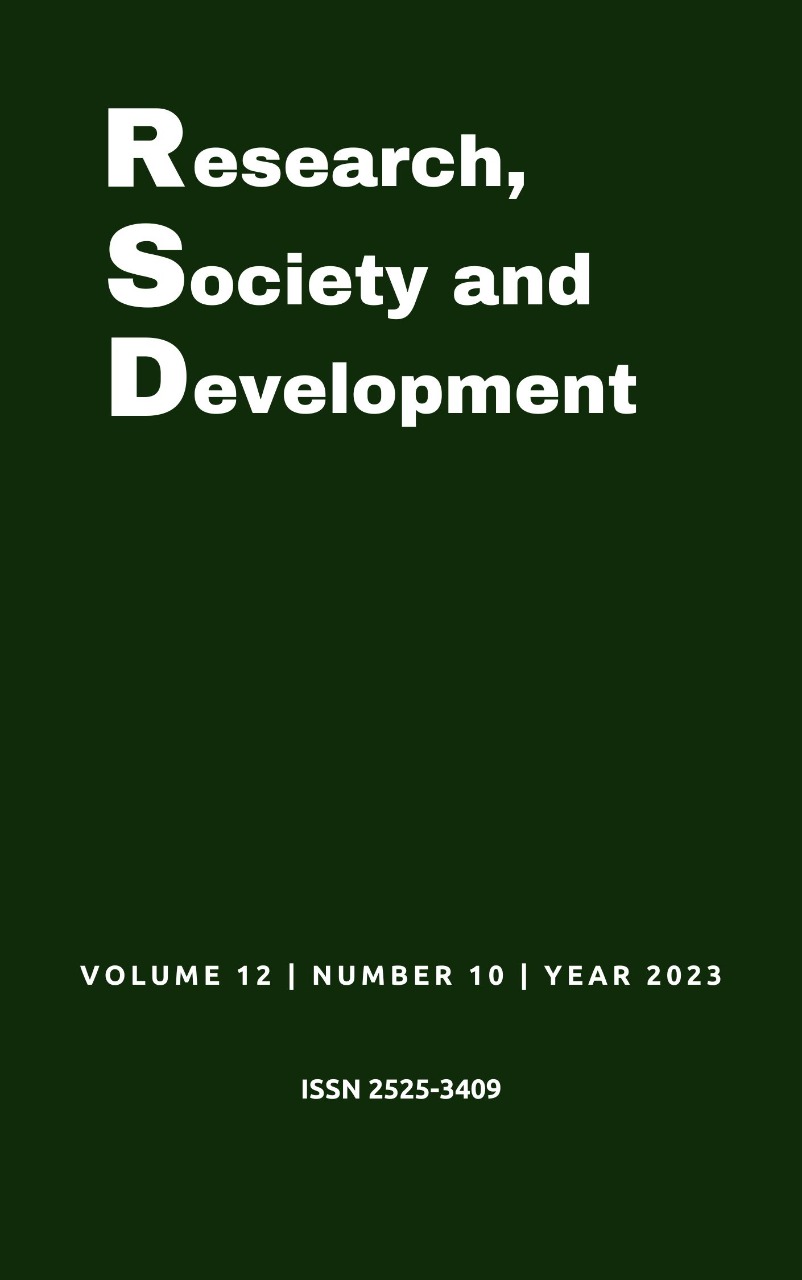O desenvolvimento de diabetes mellitus com o uso crônico de antipsicóticos atípicos em pacientes do CAPS II, da cidade de Maringá-PR
DOI:
https://doi.org/10.33448/rsd-v12i10.43283Palavras-chave:
Esquizofrenia, Transtornos mentais, Diabetes mellitus, Antipsicóticos.Resumo
Esquizofrenia é uma doença crônica, de natureza multifatorial, prevalente em 1% da população mundial. O tratamento é realizado com antipsicóticos convencionais ou atípicos. A evolução no tratamento da esquizofrenia se deu com os antipsicóticos atípicos, pois eles oferecem menos efeitos e permitem uma atuação simultânea sobre os sintomas positivos e negativos da doença. Esses fármacos são usados tanto para o controle da esquizofrenia quanto de outras psicopatologias, por exemplo, o Transtorno Afetivo Bipolar (CID F31). As bulas dos medicamentos antipsicóticos alertam para o cuidado ao utilizar o medicamento em pacientes diabéticos ou que apresentem risco de desenvolver a diabetes, sendo recomendado o monitoramento glicêmico de tais pacientes. Em decorrência desse efeito, o presente trabalho tem como objetivo realizar um levantamento de informações a respeito do desenvolvimento de diabetes, em decorrência do uso de antipsicóticos atípicos para o tratamento de esquizofrenia, transtornos esquizotípicos, transtornos delirantes e outros transtornos que se assemelham à esquizofrenia. Essa é uma pesquisa descritiva, de análise quantitativa, com ênfase em dados bibliográficos e pesquisa de campo, na qual foram coletados dados, por meio de prontuários, com pacientes de área de abrangência do centro de atenção psicossocial (CAPS II), da cidade de Maringá-PR. Os resultados encontrados por meio desse estudo foram os efeitos colaterais dos fármacos, sua relação com idade, gênero, posologia e tempo de uso. Além disso, pode-se perceber a influência multifatorial para o desenvolvimento de outras comorbidades. Com isso, é possível contribuir para orientações adequadas, enfatizando os malefícios que a administração inadequada desses medicamentos pode gerar.
Referências
Barbosa, A. M. & Portela R. G. (2021). Eficácia e segurança de aripiprazol comparado aos antipsicóticos disponíveis no SUS para tratamento de esquizofrenia em adultos: revisão rápida de evidências. Revista Científica da Escola Estadual de Saúde Pública de Goiás - “Candido Santiago”, 7(1), 1-16. https://doi.org/10.22491/2447-3405.2021.V7.7000048
Bertoni, R. A. & Leal, F. M. (2023). Revisão do tratamento da esquizofrenia: monoterapia vs associação de antipsicóticos. Debates em Psiquiatria. 13, 1-20. https://doi.org/10.25118/2763-9037.2023.v13.414
Brasil. Ministério da Saúde (2008). F20-F29 Esquizofrenia, transtornos esquizotípicos e transtornos delirantes. http://www2.datasus.gov.br/cid10/V2008/WebHelp/f20_f29.htm
Brunton, L. L., Hilal-Dandan, R. & Knollmann, B. C. (2019). As Bases Farmacológicas da Terapêutica de Goodman e Gilman. Artmed.
Buda, L. F. S. (2023). Tratamento da Esquizofrenia: monoterapia versus associação de antipsicóticos – revisão de literatura. Brazilian Journal of Health Review, 6(3), 9115–9120. https://doi.org/10.34119/bjhrv6n3-060
Dalgalarrondo, P. (2008). Psicopatologia e semiologia dos transtornos mentais. Artmed.
Doménech-Matamoros P. (2020). Influence of the use of atypical antipsychotics in metabolic syndrome. Revista espanola de sanidad penitenciaria, 22(2), 80–86. https://doi.org/10.18176/resp.00014
Fulone, I., Silva, M. T., & Lopes, L. C. (2023). Use of atypical antipsychotics in the treatment of schizophrenia in the Brazilian National Health System: a cohort study, 2008-2017. Epidemiologia E Serviços De Saúde, 32(1), e2022556. https://doi.org/10.1590/S2237-96222023000300015
Grilo, R. R. da C. (2020). Efeitos adversos metabólicos dos antipsicóticos atípicos: uma revisão da literatura (Trabalho de Conclusão de Curso, Universidade de Brasília, Brasília, DF). Recuperado de http://dx.doi.org/10.26512/2020.TCC.28598
Junior, C. G. K. & Rosar, P. A. (2020). Perfil demográfico de distribuição de antipsicóticos de segunda geração para pacientes com Transtorno Afetivo Bipolar, Transtorno Esquizoafetivo e Esquizofrenia em Santa Catarina (Trabalho de Conclusão de Curso, Universidade do Sul de Santa Catarina, Palhoça, SC). Recuperado de https://repositorio.animaeducacao.com.br/handle/ANIMA/9254
Mari, J. J., & Leitão, R. J. (2000). A epidemiologia da esquizofrenia. Brazilian Journal of Psychiatry, 22, 15–17. https://doi.org/10.1590/S1516-44462000000500006
Mendonça, A. M., Moura, J. A., Araújo, P. B. de O. & Almeida, S. D. (2022). Environmental and genetic factors associated with the development of Type 2 Diabetes mellitus: systematic review. Research, Society and Development, 11(16), e257111638325. https://doi.org/10.33448/rsd-v11i16.38325
Merchán-Hamann, E. & Tauil, P. L. (2021). Proposta de classificação dos diferentes tipos de estudos epidemiológicos descritivos. Epidemiologia E Serviços De Saúde, 30(1), e2018126. https://doi.org/10.1590/s1679-49742021000100026
Narváez, A. A. V., Chamorro, G. A., & López, L. M. R. (2020). Diabetes mellitus asociada al uso crónico de antipsicóticos atípicos. Revista Médica de Risaralda, 26(2), 148-153. https://doi.org/10.22517/25395203.24439
Rang, H. P., Dale, M. M., Ritter, J. M., Flower, R. J. & Henderson, G. (2012). Rang & Dale Farmacologia. Elsevier.
Sadok, B. J., Sadok, V. A., & Ruiz, P. (2017). Compêndio de psiquiatria: ciência do comportamento e psiquiatria clínica. Artmed.
Sena, E. P. de., Sampaio, A. S., Quarantini, L. de C., & Oliveira, I. R. de. (2003). Diabetes mellitus e antipsicóticos atípicos. Brazilian Journal of Psychiatry, 25(4), 253–257. https://doi.org/10.1590/S1516-44462003000400014
Silva, R. C. B. da. (2006). Esquizofrenia: uma revisão. Psicologia USP, 17(4), 263–285. https://doi.org/10.1590/S0103-65642006000400014
Teixeira, P. J. R. & Rocha, F. L. (2006). Efeitos adversos metabólicos de antipsicóticos e estabilizadores de humor. Revista De Psiquiatria Do Rio Grande Do Sul, 28(2), 186–196. https://doi.org/10.1590/S0101-81082006000200011
Wannmacher, L. (2004). Antipsicóticos atípicos: mais eficazes, mais seguros? Uso racional de medicamentos. 1(12). https://bvsms.saude.gov.br/bvs/publicacoes/HSE_URM_APS_1104.pdf
Downloads
Publicado
Edição
Seção
Licença
Copyright (c) 2023 Mariana Teixeira Leal Batista Olivieri ; Ana Elisa Ress Socio Vieira; Emilene Dias Fiuza Ferreira

Este trabalho está licenciado sob uma licença Creative Commons Attribution 4.0 International License.
Autores que publicam nesta revista concordam com os seguintes termos:
1) Autores mantém os direitos autorais e concedem à revista o direito de primeira publicação, com o trabalho simultaneamente licenciado sob a Licença Creative Commons Attribution que permite o compartilhamento do trabalho com reconhecimento da autoria e publicação inicial nesta revista.
2) Autores têm autorização para assumir contratos adicionais separadamente, para distribuição não-exclusiva da versão do trabalho publicada nesta revista (ex.: publicar em repositório institucional ou como capítulo de livro), com reconhecimento de autoria e publicação inicial nesta revista.
3) Autores têm permissão e são estimulados a publicar e distribuir seu trabalho online (ex.: em repositórios institucionais ou na sua página pessoal) a qualquer ponto antes ou durante o processo editorial, já que isso pode gerar alterações produtivas, bem como aumentar o impacto e a citação do trabalho publicado.


